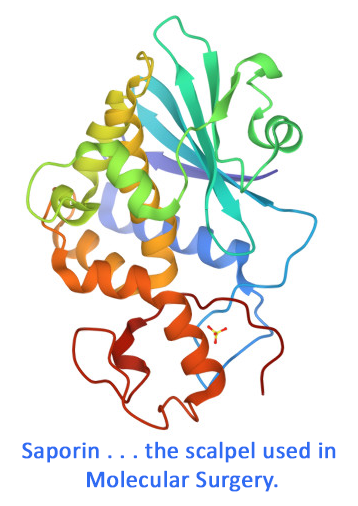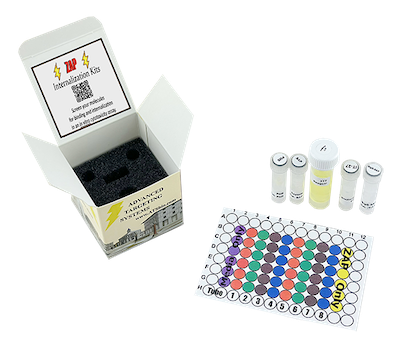Mab-ZAP uses your primary mouse monoclonal IgG antibody to target and eliminate cells that recognize your primary antibody. This secondary conjugate uses the secondary antibody (affinity-purified goat anti-mouse IgG) to “piggyback” onto YOUR mouse primary antibody. Mab-ZAP can be utilized for screening mouse IgG antibodies for internalization and/or their suitability to make potent immunotoxins.
Mab-ZAP is a chemical conjugate of affinity-purified goat anti-mouse IgG and the ribosome-inactivating protein, saporin. It uses your mouse primary antibody to target and eliminate cells. This secondary conjugate is used to evaluate the potential of a primary antibody to internalize.
Mab-ZAP is available individually (Cat. #IT-04) or as a kit (Cat. #KIT-04) which includes Mab-ZAP, Saporin (Cat. #PR-01), Goat IgG-SAP (Cat. #IT-19) and reagents for developing a cytotoxicity assay.
Other ZAP Conjugates:
Need another ZAP Conjugate for your target? Check here for other species & targets including in vivo and in vitro options.
keywords: Mouse Antibody, Mouse Primary, Mouse Monoclonal, Anti-Mouse IgG, Screening, ADC, Antibody Drug Conjugate, in vitro, Secondary
Saporin as a commercial reagent: its uses and unexpected impacts in the biological sciences-tools from the plant kingdom
Ancheta LR, Shramm PA, Bouajram R, Higgins D, Lappi DA (2022) Saporin as a commercial reagent: its uses and unexpected impacts in the biological sciences-tools from the plant kingdom. Toxins (Basel) 14(3):184. doi: 10.3390/toxins14030184 PMID: 35324681
Summary: Saporin is a ribosome-inactivating protein that can cause inhibition of protein synthesis and causes cell death when delivered inside a cell. Development of commercial Saporin results in a technology termed ‘molecular surgery’, with Saporin as the scalpel. Its low toxicity (it has no efficient method of cell entry) and sturdy structure make Saporin a safe and simple molecule for many purposes. The most popular applications use experimental molecules that deliver Saporin via an add-on targeting molecule. These add-ons come in several forms: peptides, protein ligands, antibodies, even DNA fragments that mimic cell-binding ligands. Cells that do not express the targeted cell surface marker will not be affected. This review will highlight some newer efforts and discuss significant and unexpected impacts on science that molecular surgery has yielded over the last almost four decades. There are remarkable changes in fields such as the Neurosciences with models for Alzheimer’s Disease and epilepsy, and game-changing effects in the study of pain and itch. Many other uses are also discussed to record the wide-reaching impact of Saporin in research and drug development.
Read complete article.
Cellular uptake of vitamin B12: Role and fate of TCblR/CD320, the transcobalamin receptor.
Gick GG, Arora K, Sequeira JM, Nakayama Y, Lai SC, Quadros EV (2020) Cellular uptake of vitamin B12: Role and fate of TCblR/CD320, the transcobalamin receptor. Exp Cell Res 396(1):112256. doi: 10.1016/j.yexcr.2020.112256
Summary: The increased and sustained expression of TCblR in proliferating cells has been used to target toxins preferentially to cancer cells and can be potentially used for targeted delivery of other anti-cancer drugs. In 2010 the authors published a paper which evaluated the potential of using immunotoxins to eliminate cancer cells expressing TCblR the authors performed a series of in vitro experiments using their monoclonal antibody plus Mab-ZAP in varying concentrations. The results indicated that this is a viable therapeutic model that causes minimal peripheral damage.
Related Products: Mab-ZAP (Cat. #IT-04)
Targeting of embryonic annexin A2 expressed on ovarian and breast cancer by the novel monoclonal antibody 2448
Cua S, Tan HL, Fong WJ, Chin A, Lau A, Ding V, Song Z, Yang Y, Choo A (2018) Targeting of embryonic annexin A2 expressed on ovarian and breast cancer by the novel monoclonal antibody 2448. Oncotarget 9:13206-13221. doi: 10.18632/oncotarget.24152
Objective: To develop mAbs to potentially target oncofetal antigens and be repurposed for antibody or antibody drug conjugate (ADC) therapy.
Summary: The novel IgG1, 2448, was shown to target a unique glycosylated surface epitope on ANXA2. As a possible therapeutic candidate for ovarian and breast cancer, 2448 demonstrated anti-tumor activity via two independent mechanisms of action.
Usage: Cells were seeded in 96-well plates at 1000 or 2000 cells/well. Primary antibody, 2448 or ch2448 (10 μg/mL) was pre-mixed with appropriate secondary saporin conjugate, Mab-ZAP or Hum-ZAP. The most significant decreases in cell viability (20% to 60%) were observed against the epithelial IGROV1 and MCF7 cell lines. ATS created a Custom ADC by direct conjugation of saporin to ch2448 (ch2448-SAP). As a control, an isotype chimeric IgG was also conjugated to saporin (IgG-SAP). Compared to using secondary saporin conjugates, ch2448-SAP induced and increase of 20–30% cytotoxicity.)
Related Products: Mab-ZAP (Cat. #IT-04), Hum-ZAP (Cat. #IT-22), Custom Conjugates
Evaluate Potential Targeting Molecules.
Kohls M (2006) Evaluate Potential Targeting Molecules. Nature Methods
Summary: Targeted toxins -- targeting agents conjugated to saporin -- are widely used to eliminate specific cell populations both in vitro and in vivo. For these molecules to be effective, it is vital that the targeting component of the conjugate specifically binds the cells of interest. A secondary conjugate, Streptavidin-ZAP, has been created by attaching the toxin saporin to streptavidin. The user can combine primary biotinylated material with Streptavidin-ZAP to quickly and economically screen potential targeting molecules for internalization and specificity. Once the appropriate targeting molecule is identified, a direct conjugation with saporin can be performed.
Related Products: Streptavidin-ZAP (Cat. #IT-27)
Read the article.
browse all references for this product | back to top



Reviews
There are no reviews yet.